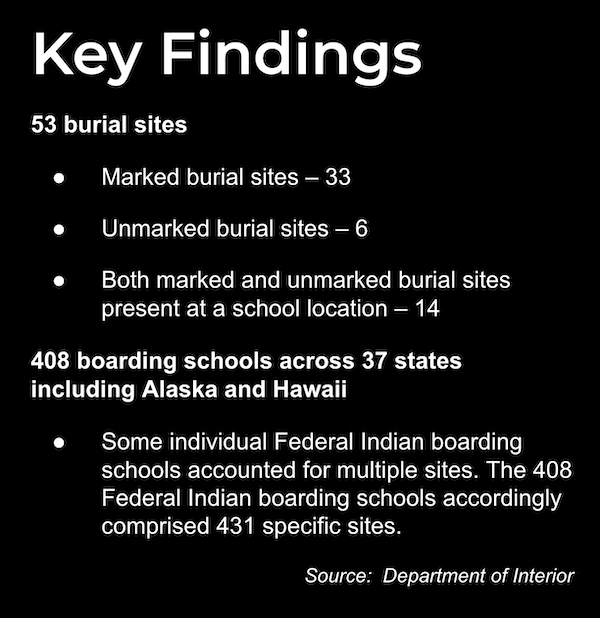
- Details
- By Jenna Kunze
Indian boarding school survivors and their descendants are invited to submit written testimony to the House Natural Resource Subcommittee for Indigenous People in support of legislation that would create a Truth and Healing Commission on Indian Boarding Schools in the United States.
The commission would investigate the impacts and ongoing effects of the Indian boarding school policies, and would be tasked with developing recommendations on ways to: protect unmarked graves and accompanying land protections; support repatriation and identify the Tribal nations from which children were taken; and discontinue the removal of American Indian, Alaska Native, and Native Hawaiian children from their families and tribal communities by state social service departments, foster care agencies, and adoption agencies.
The House Natural Resource Subcommittee for Indigenous Peoples held a hearing on the legislation on Thursday, May 12. Boarding school survivors and leaders of organizations representing them testified in support of the legislation, often citing the abuses children endured and how that has impacted their lives.
The National Native American Boarding School Healing Coalition (NABS) is encouraging those impacted by boarding schools to submit written testimony to the subcommittee by May 26.
“The House allows for written testimony until May 26, 2022. Therefore, we are humbly asking you to share your story by emailing the House Natural Resource Committee at: [email protected] and CC NABS at [email protected],” NABS director Deborah Parker wrote on Facebook.
The Native American Boarding School Health Coalition has a one-pager that includes key provisions of the law, and information about why such a commission is necessary for Indian Country.
Testimony must be typed into a word document and submitted by emailing [email protected]. NABS created a draft template to follow for those looking for a place to start.
Tell Us What You Think
More Stories Like This
50 Years of Self-Determination: How a Landmark Act Empowered Tribal Sovereignty and Transformed Federal-Tribal RelationsNavajo Nation Council Members Attend 2025 Diné Action Plan Winter Gathering
Ute Tribe Files Federal Lawsuit Challenging Colorado Parks legislation
NCAI Resolution Condemns “Alligator Alcatraz”
NABS Documents 134 More Survivor Stories, Expands Digital Archive in 2025
Help us defend tribal sovereignty.
At Native News Online, our mission is rooted in telling the stories that strengthen sovereignty and uplift Indigenous voices — not just at year’s end, but every single day.
Because of your generosity last year, we were able to keep our reporters on the ground in tribal communities, at national gatherings and in the halls of Congress — covering the issues that matter most to Indian Country: sovereignty, culture, education, health and economic opportunity.
That support sustained us through a tough year in 2025. Now, as we look to the year ahead, we need your help right now to ensure warrior journalism remains strong — reporting that defends tribal sovereignty, amplifies Native truth, and holds power accountable.
 The stakes couldn't be higher. Your support keeps Native voices heard, Native stories told and Native sovereignty defended.
The stakes couldn't be higher. Your support keeps Native voices heard, Native stories told and Native sovereignty defended.
Stand with Warrior Journalism today.
Levi Rickert (Potawatomi), Editor & Publisher


